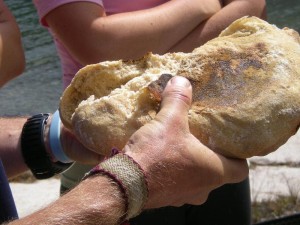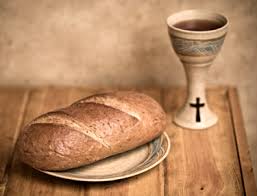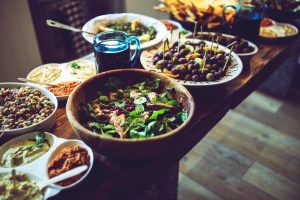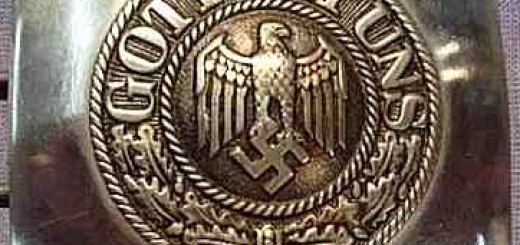That final week: that last supper
No one except Jesus himself knew that this was to be their last supper together. What we’ve come to know as the Last Supper was named that after the event with the benefit of hindsight. I wonder if Jesus’ followers had any sense that something was up. Had they noticed anything odd about the things that Jesus was doing and saying since their arrival in Jerusalem? Was there a feeling in the air that everything was coming to a head? We can only speculate. Maybe that last supper didn’t feel significant at all to them at the time.
I left my dad in hospital at 6pm on the night that he died. Of course, I didn’t know he was going to die that night. If I’d known, I wouldn’t have left. I don’t believe he knew for sure either. And so we said our goodbyes in the same way as every other time we had said goodbye. There was nothing particularly special until it became the last goodbye. After he died, I went over and over that final goodbye, searching for significance, for anything that would have indicated to me that this was the last time I was ever to see my dad.
Maybe that’s what Jesus’ followers did too.
Judas must have known that something was up. He’d already agreed to betray Jesus. He’d become disillusioned with Jesus and his teaching. Jesus wasn’t the kind of leader he’d been hoping for. Maybe he’d become persuaded by the bad press the spiritual leaders had been spreading about Jesus. Maybe he just wanted out. Maybe he was just greedy and was swayed by the money on offer. We will never know what motivated Judas in the end.
And Judas went to the chief priests and the officers of the temple guard and discussed with them how he might betray Jesus. They were delighted and agreed to give him money. He consented, and watched for an opportunity to hand Jesus over to them when no crowd was present. Luke 22:4-6
Jesus knew. He knew he was going to be betrayed and who was going to betray him. He knew he was going to be denied and who was going to deny every having known him. He knew the time for his suffering and death was upon him. He knew that the disciples would look back on this final meal and try to make sense of it all. And that they would find significance in the things that Jesus had said that they didn’t understand at the time but had since come true, exactly as Jesus had said.
I am telling you now before it happens, so that when it does happen you will believe that I am who I am. John 13:19
They’d had plenty of experience of that in the past: Jesus giving them precise instructions as to what to do and everything being just as Jesus had told them it would be. Even before this meal, Jesus had it all planned out.
“Go into the city, and a man carrying a jar of water will meet you. Follow him. Say to the owner of the house he enters, ‘The Teacher asks: Where is my guest room, where I may eat the Passover with my disciples?’ He will show you a large room upstairs, furnished and ready. Make preparations for us there.”
The disciples left, went into the city and found things just as Jesus had told them. So they prepared the Passover. Mark 14:13-16
 After my dad died, I brought home various items of significance from his house to remember him by. And so when I place a cup on my coffee table, I think of my dad. When I use his umbrella, I think of him. But I also think of him every time I buy yellow roses or eat strawberries. There are things that I did with him that remind me of him when I do them now.
After my dad died, I brought home various items of significance from his house to remember him by. And so when I place a cup on my coffee table, I think of my dad. When I use his umbrella, I think of him. But I also think of him every time I buy yellow roses or eat strawberries. There are things that I did with him that remind me of him when I do them now.
I think this is what Jesus was planting in the minds and hearts of his followers when he passed the cup of wine around and broke the bread into pieces to share. He hoped that every time they drank wine and ate bread in the future, they would be reminded of this moment, be reminded of his body and his blood, his sacrifice for them.
And he took bread, gave thanks and broke it, and gave it to them, saying, ‘This is my body given for you; do this in remembrance of me.’
In the same way, after the supper he took the cup, saying, ‘This cup is the new covenant in my blood, which is poured out for you. Luke 22:19-22
 I don’t believe that Jesus intended this act of remembrance to be what it has become today. I believe he intended it to be much more simple than that: that when his followers gathered to eat together, they would remember him in the bread and the wine that was part of every meal at that time. It soon became a ritual however. With the best intentions of making this remembrance significant and holy, traditions and rules soon grew up around this simple act. It soon became something you had to do in a certain way in a certain place at a certain time with special words and special bread and special wine. And in so doing, it became something that people did less and less – once a week on a Sunday, maybe even once a month. Things have changed since Jesus’ day. We don’t meet together to eat any more. We don’t have bread and wine with every meal. We have sliced bread, not bread you take in your hands and break chunks off. We each have a wine glass to ourselves and don’t pass the wine around in the same way.
I don’t believe that Jesus intended this act of remembrance to be what it has become today. I believe he intended it to be much more simple than that: that when his followers gathered to eat together, they would remember him in the bread and the wine that was part of every meal at that time. It soon became a ritual however. With the best intentions of making this remembrance significant and holy, traditions and rules soon grew up around this simple act. It soon became something you had to do in a certain way in a certain place at a certain time with special words and special bread and special wine. And in so doing, it became something that people did less and less – once a week on a Sunday, maybe even once a month. Things have changed since Jesus’ day. We don’t meet together to eat any more. We don’t have bread and wine with every meal. We have sliced bread, not bread you take in your hands and break chunks off. We each have a wine glass to ourselves and don’t pass the wine around in the same way.
For many, the service of Holy Communion is a very special time of remembrance and that has to be a good thing. I often find it very helpful to take time out in this way and remember. But I wish we didn’t reserve this remembering just to one place and one time. Wouldn’t it be great if every time we ate bread and drank wine, we remembered and celebrated what Jesus has done for us? Wouldn’t it be great to get in the habit of eating together more?
At the time, Jesus’ disciples really missed the significance of what was going on. They got distracted by speculating about which one of them would betray Jesus. They started bickering about which one of them was the greatest. They must have been kicking themselves afterwards when they looked back and realised how they had squandered those final moments in the presence of Jesus.
We could learn a lot from that.
Jesus left his followers with a final message. If they were to remember one thing, then this was the one thing to remember.
My children, I will be with you only a little longer. You will look for me, and just as I told the Jews, so I tell you now: where I am going, you cannot come.
A new command I give you: love one another. As I have loved you, so you must love one another. By this everyone will know that you are my disciples, if you love one another. John 13:33-35
 That’s it. We have built up a religion and an institution that is the church around the life and death of Jesus. Maybe he never intended for that to happen at all. Maybe he wanted us to simply concentrate on loving each other. Maybe the traditions and rituals and institutions have become a distraction from that simple message that Jesus left with his followers. Maybe much of what we do is a colossal adventure in missing the point. It feels like that sometimes.
That’s it. We have built up a religion and an institution that is the church around the life and death of Jesus. Maybe he never intended for that to happen at all. Maybe he wanted us to simply concentrate on loving each other. Maybe the traditions and rituals and institutions have become a distraction from that simple message that Jesus left with his followers. Maybe much of what we do is a colossal adventure in missing the point. It feels like that sometimes.
So let’s come back to this as we approach this Easter. Let us find ways to meet together and eat together and love each other. Let us find ways to remember Jesus in the meals that we share with each other – in the simplicity of the bread and the wine on our tables.












